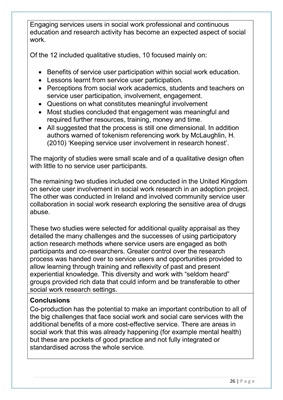
26 | P a g e
Engaging services users in social work professional and continuous
education and research activity has become an expected aspect of social
work.
Of the 12 included qualitative studies, 10 focused mainly on:
Benefits of service user participation within social work education.
Lessons learnt from service user participation.
Perceptions from social work academics, students and teachers on
service user participation, involvement, engagement.
Questions on what constitutes meaningful involvement
Most studies concluded that engagement was meaningful and
required further resources, training, money and time.
All suggested that the process is still one dimensional. In addition
authors warned of tokenism referencing work by McLaughlin, H.
(2010) 'Keeping service user involvement in research honest'.
The majority of studies were small scale and of a qualitative design often
with little to no service user participants.
The remaining two studies included one conducted in the United Kingdom
on service user involvement in social work research in an adoption project.
The other was conducted in Ireland and involved community service user
collaboration in social work research exploring the sensitive area of drugs
abuse.
These two studies were selected for additional quality appraisal as they
detailed the many challenges and the successes of using participatory
action research methods where service users are engaged as both
participants and co-researchers. Greater control over the research
process was handed over to service users and opportunities provided to
allow learning through training and reflexivity of past and present
experiential knowledge. This diversity and work with "seldom heard"
groups provided rich data that could inform and be transferable to other
social work research settings.
Conclusions
Co-production has the potential to make an important contribution to all of
the big challenges that face social work and social care services with the
additional benefits of a more cost-effective service. There are areas in
social work that this was already happening (for example mental health)
but these are pockets of good practice and not fully integrated or
standardised across the whole service.